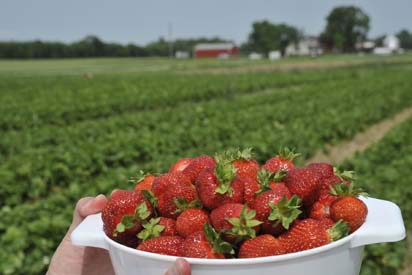Berries Cut Women's Heart Attack Risk

Regularly eating lots of strawberries and blueberries may be good for women's hearts, a new study suggests.
The results show that women who ate high amounts of compounds called anthocyanins — most commonly through eating strawberries and blueberries — were 32 percent less likely to have a heart attack over a two-decade period compared with women who consumed low amounts of the compounds.
Anthocyanins may dilate arteries and prevent plaque buildup, according to the researchers from the Harvard School of Public Health in Boston.
Previous studies have found a link between blueberry consumption and a reduced risk of high blood pressure, a risk factor for heart attacks.
The researchers note that the new study only found an association, and not a cause-effect link. In addition, while strawberries and blueberries were the main sources of anthocyanins, they are found in other foods as well, including blackberries, eggplant and grapes.
The American Heart Association (AHA) says eating a variety of foods is the best way to get proper amounts of the nutrients we need. Berries can be part of a balanced diet that includes other fruits as well as vegetables and whole grains, the AHA says. [See 6 Easy Ways to Eat More Fruits and Vegetables.]
The study is published today (Jan. 14) in the journal Circulation: Journal of the American Heart Association.
Sign up for the Live Science daily newsletter now
Get the world’s most fascinating discoveries delivered straight to your inbox.
The study involved 93,600 American women ages 25 to 42 who answered questions about their diet every four years for 18 years. During the study, 405 heart attacks were reported.
The results held even after the researchers took into account other factors that could influence the risk of heart attack, including blood pressure, body mass index, exercise, smoking habits and alcohol intake.
However, because these factors were self-reported, it's possible they were not entirely accurate. In addition, other unmeasured factors might explain the link.
Dr. Andrew Freeman, a cardiologist at the National Jewish Health Center hospital in Denver, who was not involved in the study, suspects that people who had diets rich in anthocyanins also tended to live a more healthy lifestyle overall, which contributed to their lower risk of heart attack.
To reduce the risk of cardiovascular problems, Freeman recommends people eat as much of a plant-based diet as possible.
The study was funded by the National Institutes of Health, and by the Biotechnology and Biological Sciences Research Council of the United Kingdom.
Pass it on: Eating strawberries and blueberries may reduce the risk of heart attack in women.
Follow Rachael Rettner on Twitter @RachaelRettner, or MyHealthNewsDaily @MyHealth_MHND. We're also on Facebook & Google+.

Rachael is a Live Science contributor, and was a former channel editor and senior writer for Live Science between 2010 and 2022. She has a master's degree in journalism from New York University's Science, Health and Environmental Reporting Program. She also holds a B.S. in molecular biology and an M.S. in biology from the University of California, San Diego. Her work has appeared in Scienceline, The Washington Post and Scientific American.









